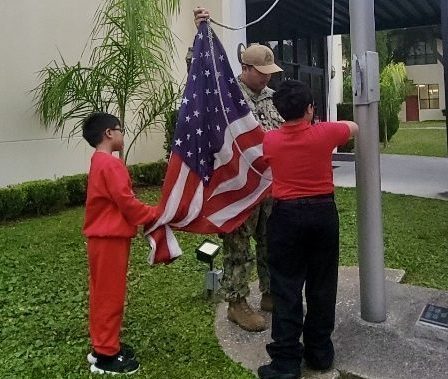
Jackson Pelletier’s enrollment at St. Paul’s Catholic School Riverside on an education choice scholarship began with a trip to the pediatrician.
That’s when his parents, Natasha and Greg, noticed the private school in Jacksonville across the street from the doctor’s office.
The family had just moved to the area from San Diego after Greg, a gunnery sergeant in the Marines, had been assigned to the Blount Island Command, a Marine Corps support facility in Jacksonville, Florida.
Jackson attended his district school, and that was fine, Greg said. However, Greg attended a Catholic elementary school and always wanted that faith-based education for Jackson and his younger brother, Cameron.
“I feel like it definitely helped me in my formative years, and I wanted that foundation for my kids, as well,” he said.
But he and Natasha felt Greg’s military salary could not support the cost of private school.
Still, Greg took a tour of St. Paul’s, and was surprised when Stasia Holzbaur, St. Paul’s office manager, admissions director and military liaison, told him about the scholarships managed by Step Up For Students.
“I think that’s great,” Greg said. “It definitely lifts a burden and allows us to put our kids in a good school that we probably wouldn't be able to afford otherwise.”
In 2021, Florida lawmakers made the Florida Tax Credit Scholarship, Family Empowerment Scholarship for Educational Options and Family Empowerment Scholarship for Students with Unique Abilities accessible to military families.
Jackson, now in the fifth grade, receives the Florida Tax Credit Scholarship. Cameron is in pre-K and not yet eligible for a scholarship.
“The scholarships have been a game-changer for military families,” Holzbaur said. “Especially for those families with multiple children who want to put them in a Catholic school.”
The Pelletiers have been married since 2012. During that time, Greg has been stationed in New York, Massachusetts, North Carolina, California and now Jacksonville.
“We absolutely love it,” Natasha said. “Greg has a great career, and he’s supported our family throughout the years. We love going to new places. When it was just me and Greg, it was fine. But now our kids are involved, and it's a little tougher for them. We’re able to adjust fast, but it is an adjustment for our kids.”
The family arrived from San Diego in the summer of 2023. Jackson was enrolled in a new school, making the adjustments all children make when they switch schools. He would make another once his parents learned of the state education choice scholarships.
“Jackson loves St. Paul’s,” said Natasha, who works at the school as a pre-K4 assistant. “He has a ton of friends. He likes the small class sizes. He can focus more and get a little more help from his teachers.”
Jackson and Cameron are going to have to make that adjustment again when Greg’s assignment in Jacksonville ends this summer. The next move could be back to San Diego or to Okinawa, Japan.
“We don't have a choice, but we make wherever we go home,” Natasha said.
With children from 23 military families enrolled at St. Paul’s, Jackson has classmates who live the same itinerant life as he and Cameron. Some of those military families have a parent who is deployed. In one family, both parents are deployed.
Greg, who has been a Marine for 15 years, spent two months in Virginia earlier this year. He recently spent a week in Okinawa.
“No one knows how hard it is on a military kid,” Natasha said. “They go to school; they make friends; they have a group of friends, and then in three years, they leave and do it all over again. It’s nice that at St. Paul’s, he has a little community that knows exactly what he’s going through.”
As a state-designated Purple Star school that supports the unique needs of military families, St. Paul’s is required to:
“They understand the sacrifices military families make, and they are understanding,” Greg said.
Holzbaur has gathered photos of the school’s military parents. They will be displayed on a wall of heroes on Veterans Day. The families are invited to attend a reception after the mass that day.
It’s part of her job to lead the tour when a miliary family visits the school. She said she’s surprised at how many parents don’t believe her when she tells them about the scholarships. Because most are from out of state, they are not familiar with Florida’s parent-directed education policies.
“It’s so nice to see the look on their faces the first time they hear about it, and they realize they can afford to send their kids here,” Holzbaur said.
You can count Greg and Natasha among that group.
“It was a relief knowing our boys were going to go to a good school and get a good education,” she said. “With the scholarship, it’s amazing.”
 Around the state: Parents in Palm Beach can use a bus tracking service for their student, an associate professor is teaching students at University of Florida the importance of recycling batteries, the "Fight Book Bans Act" has been proposed and chronic absenteeism is being addressed across the state. Here are details about those stories and other developments from the state’s districts, private schools, and colleges and universities:
Around the state: Parents in Palm Beach can use a bus tracking service for their student, an associate professor is teaching students at University of Florida the importance of recycling batteries, the "Fight Book Bans Act" has been proposed and chronic absenteeism is being addressed across the state. Here are details about those stories and other developments from the state’s districts, private schools, and colleges and universities:
Broward: The private school in south Florida that recently fired an employee over posts related to the Israel-Hamas war released a statement on Friday after the former employee discussed her ordeal. The Pine Crest School reported terminating an employee on Nov. 19 after social media posts that were "hateful and incendiary" to a degree that the school "will never" tolerate. WPLG.
Palm Beach: County officials here are expanding the bus tracking service. "Here Comes the Bus" is available via a website and an app allowing parents to opt-in to watch their child's school bus to know when it arrives at the student's stop. South Florida Sun-Sentinel.
Pasco: The school district here is introducing a new approach to the school calendar in the 2024-25 school year to help with chronic absenteeism. The schedule will include several "four-day mini breaks strategically placed throughout the years," according to the district. The extended weekends will be held from Oct. 12-15, 2024, February 14-17, 2025 and April 18-21, 2025. “This forward-thinking initiative not only benefits students but also accommodates the needs of parents and guardians who often struggle to coordinate family vacations with the academic calendar,” the district added. Fox 59.
Alachua: The Florida Music Education Association recently announced that 36 students from 11 Alachua County Public Schools have been selected as all state musicians. The students will participate in 13 all state ensembles at the annual FMEA conference in January in Tampa. Main Street Daily News.
Purple Star schools: Schools in Florida recently spent part of their day participating in the "Holiday Letters for Heroes" program for deployed service members. Nelson Elementary School is in the first group of Purple Star schools in the state. On Friday, students wrote letters to members of the Florida National Guard to show support and bring holiday cheer to our service members. Students were also able to learn all about Florida's National Guard. “They help our community, our state and sometimes they even get deployed, they get activated to go to another part of the country to help,” said second-grade teacher Sheena Longstreth. Bay News 9.
Fight Book Bans Act: Congressman Maxwell Frost introduced a new bill called the "Fight Book Bans Act" during an event in Orlando on Saturday. The legislation aims to give school district's the resources they need to fight against book bans, according to Frost's website. “We believe when that book is taken off the shelf, the book ban has begun,” Frost said. The bill would allow the Department of Education to help school district's cover the cost of fighting the book ban, which could include retaining legal representation, traveling to hearings on book bans and getting expert research. The Department of Education would be able to provide up to $100,000 to a school district with the total appropriation capped at $15 million over five years. WKMG.
Colleges and universities: A proposal to drop sociology from general education requirements for public college students has prompted controversy. Florida Education Commissioner Manny Diaz Jr. proposed replacing the sociology course with "Introductory Survey to 1877," which is an American history class that would allow students to meet the state's civic competency requirements. The change is still subject to a final vote in January. Orlando Weekly. Meanwhile, the high demand for housing in South Florida is taking a toll on college students. Many students face the challenge of balancing several jobs and classes to stay afloat financially and academically. WLRN. Katerina Aifantis, a University of Florida associate professor of mechanical and aerospace engineering, found a discarded battery on campus and began a movement to teach students and the public about recycling them. Aifantis, who has been at UF since 2017, teaches the only battery course and has now organized two battery recycling drives. Miami Herald.
Chronic absences: Florida may have been among the first states to reopen its schools after the COVID-19 outbreak, but the state is exhibiting symptoms of a plague nationally that has gotten worse since the virus began: Absenteeism in schools. Rep. Dana Trabulsy of Fort Pierce noted that 30% of the state's students, or about 987,000, are chronically absent from school. That's defined broadly as when kids miss 10% of school, or 18 days a year, of the prescribed 180 days that make up an academic year. More than 70% of Florida schools have 20% of their students meeting the definition of chronically absent, officials say. Florida Politics.
Opinions on schools: A new scathing report documents the "horrifying" deterioration of higher education in Florida. It should be required reading for every college student, and, come to think of it, taxpayers, too. Steve Bousquet, South Florida Sun-Sentinel. Should cellphones be banned in classrooms? That question is being asked around the state. Tampa Bay Times Editorial Board. The pandemic merely illuminated and exacerbated what has been happening in American education for years: The systematic dismantling of a culture of high expectation. Aimee Guidera, The 74th.

A local veteran helps students at Sacred Heart Catholic School raise the American flag before the school's annual Veterans Day ceremony. The Jacksonville school was one of two Florida Catholic schools that recently earned the state's Purple Star School of Distinction designation for supporting military students and families. Photo courtesy of Sacred Heart Catholic School
It’s tough being the new kid in school. It’s even tougher being the new kid every two to three years.
That’s the norm for 1.2 million United States children born into military families. According to the Military Child Education Coalition, military-connected children move six to nine times between kindergarten and high school graduation.
Florida lawmakers recognized the stress such transitions can create and in 2021 passed HB 439 with bipartisan support to establish a Purple Star Schools of Distinction program in the Sunshine State.
The law grants schools that meet certain criteria to be military-friendly the designation of Purple Star Schools of Distinction. The program is open to public schools as well as private schools that accept state K-12 education choice scholarships. (Step Up For Students, which hosts this blog, is the state’s largest administrator of state education choice scholarships, which allow automatic eligibility for dependents of active-duty military members.) So far, 121 schools across the state have earned the designation, including two private schools: Sacred Heart Catholic School in Jacksonville and St. John the Evangelist Catholic School in Pensacola.
Both schools are located close to military bases; Jacksonville boasts the third-largest military presence in the United States.
“We’ve always had a long history or supporting military families and the students who have been enrolled,” said Sacred Heart Principal Archie Yumul, who earned a medical degree before deciding in 2005 to trade the world of genetic research for a career in teaching, and later, school administration. His school is about three miles from the Naval Air Station in Jacksonville, so “it seemed like a good fit that we would apply for the Purple Star School designation because of our relationship with the military.”
The Purple Star Schools program has been around since 2016 thanks to Pete LuPiba, a Navy veteran and Ohio’s commissioner for Military Children Interstate Compact Commission. He wanted to create another way for schools in the Buckeye State to support military-connected children in addition to following the guidelines of the compact, which were created to replace widely varying policies all 50 states that affect transitioning military students.
However, it wasn’t until the past few years that grassroots efforts really gained momentum. So far, 34 states have passed legislation establishing the programs, while two states, Michigan and Oregon, have introduced bills.
In Florida, the state Department of Education recently established an application process for earning the designation. The requirements include the following:
At Sacred Heart, which enrolls 417 students in 3-year-old kindergarten through eighth grade this year, the school established a chapter of Anchored 4 Life, a peer-to-peer group that helps students through transitions, including those common among military families. The group works to welcome and acclimate new students, as well as provide ongoing support. Members also coordinate recognition events for military members, veterans and first responders and prepare care packages for patients in VA hospitals and nursing homes.
“As a military child, I had to relocate several times and know how challenging that can be for little ones,” said Barbara Ramos, the daughter of an Army veteran and wife of a Marine Corps veteran who now serves as the military liaison and adviser to Anchored 4 Life. Ramos also serves in the Air Force Air National Guard and so brings a parent’s perspective to her role.
“I strive to make Sacred Heart a safe and comforting environment for both the students and the parents,” she said. “I have had to deploy, and knowing my children had a true extended family with the staff and students at Sacred Heart was extremely comforting.”
Yumul said the biggest challenge the school now faces is getting the word out to the community about these military-friendly designations.
To do this, the school is circulating flyers and meeting with military contacts on the bases. They also have a display wall of their credentials and programs, hope to put up outdoor signs, and seek to engage military members as school volunteers at events such as the annual spring carnival.
Yumul said military student enrollment has grown from between 5% and 10% to between 10% and 20%.
“Our office staff, teachers, and students have taken this challenge by the horns, and we’ve just been excited to be part of the process,” he said. “We feel fortunate that we are one of two Catholic schools in the state of Florida to have this honor and distinction.”